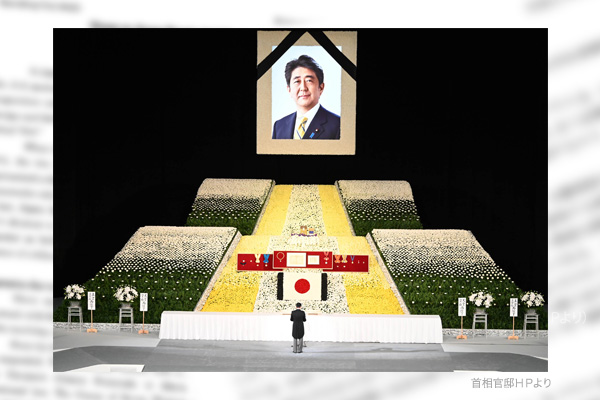A state funeral is to take place on September 27 for former Prime Minister Shinzo Abe who pledged to restore Japan.
Abe continued to ask what Japanese people or Japan are like. Reviewing Japan that has failed to amend the constitution made by the United States as an extraordinary rule to control Japan conveniently for occupation, he tried to restore the Japanese characteristics that Japan lost.
Abe tried to restore the Japanese characteristics
In a single phrase, Abe tried to restore the good Japanese spirit. For what purpose did our ancestors live on the Japanese archipelago? What did they fight to defend? What did they die to defend? Abe attempted to restore Japanese values supporting families and communities, the bond between the people and the state, the Japanese way of dealing with nature and the Japanese concept of living people’s relations with the dead.
This is the reason Abe tackled education reform, stuck to family legislation and studied a social security policy to prevent everyone from disliking this country. In the international arena, he reflected Japanese values in his strategy to increase Japan’s presence.
Abe’s “free and open Indo-Pacific” strategy was realized as Japan understood and accepted India’s national characteristics, its history and its postwar international relations. The grand strategy that originated from Japan has become a base for international order to develop the largest deterrence to China involving Western and Asian countries.
The peace and security legislation that Abe fiercely struggled to realize made the Japan-U.S. alliance that is indispensable to Japan’s defense closer to a mutually beneficial relation. It is natural for Japan to defend itself and the constitutional amendment is necessary for it. But any constitutional amendment takes time. Considering this point, Abe took advantage of his power to appoint a Director-General of the Cabinet Legislation Bureau to pave the way for realizing the peace and security legislation.
Abe demonstrated Japan’s presence to the world
Abe overhauled domestic systems to restore Japanese characteristics and demonstrated Japan’s moderate but splendid values and presence to the world. This is the reason foreign leaders lamented his death. They understand that the path he demonstrated will lead to the development of a fair international community based on universal values for human beings.
We would like to heartily thank and worship Abe. Japanese do not spoil the dead. We believe that even if the bodies perish, the souls of the dead remain in the sky, deep forests or on the waterfront, watching living people and Japan. Let’s keep a graceful attitude of praising achievements of the dead and offering sincere prayers. Through the state funeral, let’s demonstrate to the world a beautiful Japan where people as a whole calmly offer deep thanks to Abe who continued to struggle for the country.
Yoshiko Sakurai is President, Japan Institute for National Fundamentals.


